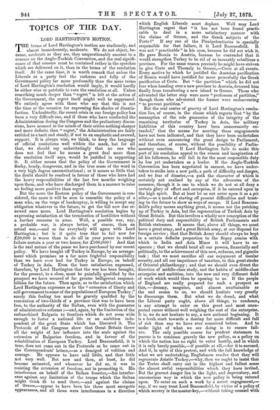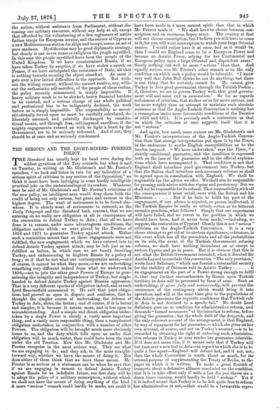TOPICS OF THE DAY.
LORD HARTINGTON'S MOTION.
THEterms of Lord Hartington's motion are studiously, and almost immoderately, moderate. We do not object, be- cause, moderate as they are, they unquestionably amount to a censure on the Anglo-Turkish Convention, and the real signifi- cance of that censure must be contained rather in the speeches which are delivered on it, than in the terms of the resolution itself. At the same time, it is worth remark that unless the Liberals as a party feel the rashness and folly of the Government policy far more profoundly than the mere terms of Lord Hartington's resolution would imply, it would hardly be either wise or patriotic to vote the resolution at all. Unless something much deeper than " regret " is felt at the action of the Government, the regret itself might well be suppressed. We entirely agree with those who say that this is not the time or the occasion for expressing fine shades of dissatis- faction. Undoubtedly, the recent crisis in our foreign policy has been a very difficult one, and if those who have conducted the Administration during the Congress and the preliminary discus- sions, have aroused in the minds of their critics nothing sharper and more definite than "regret," the Administration are fairly entitled to a tacit and steady, if not to an emphatic and avowed, support. It is always wise, we think, to keep the language of official resolutions well within the mark, but for all that, we should say unhesitatingly that no one who does not feel that he means a great deal more than the resolution itself says, would be justified in supporting it. It either means that the policy of the Government is flashy, heady, dangerous, and in the true sense of the word in a very high degree unconstitutional ; or it means so little that the doubt should be resolved in favour of those who have had the heavy responsibilities of the last few months weighing upon them, and who have discharged them in a manner to raise no feeling more positive than regret.
But the more the Eastern policy of the Government is con- sidered, the more it will be seen to resemble the policy of a man who, on the verge of bankruptcy, is willing to accept any obligation whatever in the future, to get the bill now due re- newed once more. Lord Hartington's resolution begins by expressing satisfaction at the termination of hostilities without a further recourse to arms. Well, a possible war, nay, a probable war, is always better, of course, than an actual war,—and so far everybody will agree with Lord Hartington ; but is it quite true that to fail now for £20,000 is worse than to do all in your power to render failure certain a year or two hence, for £100,000? And that is the real nature of the peace we have purchased by our recent policy. We have bought off Turkey in Europe, by an arrange- ment which promises us a far more frightful responsibility than we have ever had for Turkey in Europe, on behalf of Turkey in Asia. Even the bare satisfaction expressed, therefore, by Lord Hartington that the war has been brought, for the present, to a close, must be painfully qualified by the prospect we have secured of far greater belligerent responsi- bilities for the future. Then again, as to the satisfaction which Lord Hartington expresses as to the "extension of liberty and self-government to some of the populations of European Turkey ;" surely this feeling too must be gravely qualified by the restoration of two-thirds of a province that was to have been free, to the authority of the Sultan, even with the guarantee of administrative reforms ;—and, again, by the limitation of the enfranchised Bulgaria to frontiers which do not seem wide enough to foster a national life or an ambition inde- pendent of the great State which has liberated it. The Protocols of the Congress show that Great Britain threw all the weight of her influence into the scale against the extension of Bulgarian freedom, and in favour of the rehabilitation of European Turkey. Lord Beaconsfield, it is true, does not come out in the Protocols as he came out in the Correspondents' letters,—as a demigod of volition and courage. He appears to have said little, and that little not very well. But now and then, at least, he did become animated, and whenever he did so, it was in resisting the extension of freedom, not in promoting it. His interference on behalf of the Balkan frontier,—his interfer- ence against any limitation of the troops which the Sultan might think fit to send there,--and against the claims of Greece,—appear to have been his three most energetic appearances, and all three were interferences in a direction which English Liberals must deplore. Well may Lord Hartington regret that "it has not been found practi- cable to deal in a more satisfactory manner with the claims of Greece, and the Greek subjects of the Porte ?" If any one of the Plenipotentiaries is specially responsible for that failure, it is Lord Beaconsfield. It was not " practicable " in his eyes, because he did not wish it.. He gave Bosnia to Austria, because he contended that it would strengthen Turkey to be rid of so incurably rebellious a province. For the same reason precisely he might have striven to give Crete and Thessaly to Greece,—Crete at all events. Every motive by which he justified the Austrian pacification_ of Bosnia would have justified far more powerfully the Greek pacification of Crete. But "the partition" which he did not fear when handing over a new province to Austria, deterred him finally from transferring a new island to Greece. Those who advocated the latter step were mere "professors of partition,' though those who advocated the former were endeavouring "to prevent partition."
But the real centre of gravity of Lord Hartington's resolu- tion lies, of course, in the clause which regrets that "by the assumption of the sole guarantee of the integrity of the- remaining territories of Turkey in Asia, the military liabilities of this country have been unnecessarily ex- tended," that the means for meeting these engagements- have not been indicated, and that they have been undertaken without even announcing the great design to Parliament, and therefore, of course, without the possibility of Parlia- mentary sanction. If Lord Hartington fails to make this- part of his resolution appeal to the reason and imagination of all his followers, he will fail in far the most responsible duty he has yet undertaken as a leader. If the Anglo-Turkish Convention has been negotiated in earnest, we have under- taken to strike into a new path, a path of difficulty and danger, and we fear of disaster,—a path the character of which is. certainly not realised by any of the advocates of the measure, though it is one to which we do not at all deny a. certain glory of effort and enterprise, if it be entered upon in the high spirit. But at least let us not enter upon it as a pis aller,--as a mode of staving off present difficulties and trust- ing to the future to show us ways of escape. If Lord Beacons- field's policy means anything great, it means not the patching up of Turkey in Asia but the regeneration of Turkish Asia by Great Britain. But dais involves a wholly new conception of the political duty and responsibility of British Parliaments and British statesmen. It means that, above all things, we must. have a great army, and a great British army, at our disposal for foreign service ; that that British Army should always be kept in a certain definite proportion to the Sepoy armies with which in India and Asia Minor it will have to co- operate; that we should bend all our powers, financially and politically, to the achievement of this new, arduous, and gigantic task ; that we must sacrifice all our enjoyment of insular security, and all our impatience of taxation, to this great stroke of Oriental philanthropy ; and that we should even divert the direction of middle-class study, and the habits of middle-class enterprise and ambition, into the new and very different field of work which would then be opening to us. If the people of England are really prepared for such a prospect as this,— dreamy, sanguine, and almost unattainable as the end seems to us, we should hesitate very greatly to discourage them. But what we do dread, and what the Liberal party ought, above all things, to condemn, is any attempt to enter on this great and most unex- pected career without well weighing the cost of the enterprise. It is, we do not hesitate to say, a new national beginning. It is a fresh start towards a destiny far more difficult and full of risk than any we have ever conceived before. And to make light of what we are doing is to ensure fail- ure. The only possible course for prudent statesmen to pursue is to condemn gravely the new policy, as a policy on which the nation has no right to enter hastily, and in which it is only barely possible,—if possible at all,—for it to succeed. And if, in spite of this protest, and with the full knowledge of what we are undertaking, Englishmen resolve that they will regenerate Asiatic Turkey,—why, then we ought to insist that the Tories shall carry out in the highest and fullest sense the almost awful responsibilities which they have invited. But the gravest danger lies in the light, and deprecatory, and unconscious way in which the new policy is being entered upon. To enter on such a work by a secret engagement,— nay, if we may trust Lord Beaconsfield, by virtue of a policy of which secrecy is the master-key,—without taking counsel with
the nation, without assistance from Parliament, without dis- cussing our military resources, without any help at all, except that afforded by the volunteering of a few regiments of native Indian troops for European service, and the seizure of Cyprus as a new Mediterranean station for ships and troops, seems an act of pure madness. Mystification may be good diplomatic strategy, but clearly it can never rouse or enlighten the people mystified. In this case the people mystified have been the people of the United Kingdom. If we have countermined Russia, if we have taken Turkey by surprise, if we have stolen a march on France, if we have anticipated the resistance of Italy, all that is nothing towards securing the object aimed at. At most it gets over a few initial difficulties in the approach. But with- out the willing consent, without the earnest resolve, nay, with- out the enthusiastic self-sacrifice, of the people of these realms, the policy recently commenced is simply impossible. If heavy military work is to be shirked, heavy financial burdens to be resisted, and a serious change of our whole political and professional bias to be indignantly declined, the work before us is simply impossible. The responsibility so uncon- stitutionally forced upon us must be carefully calculated, de- liberately assumed, and painfully discharged by constitu- tional means, and through free, self-imposed sacrifices, if the mighty engagements entered on with so light a heart by the Government, are to be seriously redeemed. And if not, they should be at once and as seriously condemned.



































 Previous page
Previous page